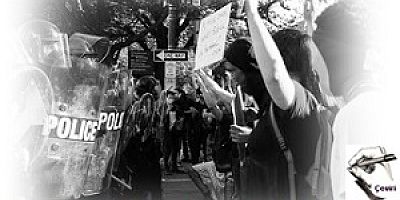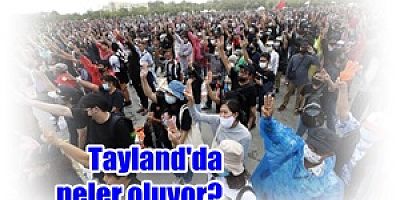
|
Tweet |


'Türkiye çökme riskiyle karşı karşıya'
|
İstanbul’un Ortaköy semtindeki ünlü gece kulübü Reina’ya düzenlenen silahlı saldırıda 39 kişi hayatını kaybetmiş, 65 kişi de yaralanmıştı.
Ortadoğu’da hemen her gün gerçekleşen bombalı saldırılara atıfta bulunulan yazıda, Irak, Libya , Suriye ve Yemen’in domino taşları gibi saldırıların bedelini ödediği, insanların hayatlarının mahvolduğu hatırlatılırken, Türkiye’nin de bu zincire eklendiği belirtildi: “Artık, bölgesel bir süper güç olan, NATO üyesi ve uzun zamandır bu acımasız destanda kurbandan çok oyun kurucu olduğu düşünülen Türkiye, şiddetin altında eziliyor.”( Now Turkey, a regional superpower, Nato member and long thought more a player than a victim in this pitiless saga, is being pulverised by violence .)
‘Türkiye gücünü hiç bu kadar yitirmemişti’
Saldırıları gerçekleştirilen grupların ‘İslamcı aşırılıkçılar, Kürt ayrılıkçılar, darbe girişiminin ardındanki laik güçler’ ve ‘Erdoğan rejimindeki daha gaddar unsurlar’ diye nitelendiği yazıda, Türkiye için şöyle dendi: “Osmanlı’nın çöküşünden bu yana ülkenin bütünlüğü ve geleceği hiç bu kadar kırılgan olmamış, gücünü de hiç bu kadar yitirmemişti. Bu da bölge, Avrupa ve dünya içi kötü haber.”
(Not since the fall of the Ottomans a century ago has the very unity and future of the nation been so precarious, and its power so obviously waning.)
‘Şiddet norm haline geldi’
Türkiye’deki saldırılar için ‘düşük düzeyde terör’ nitelemesinin kullanıldığı ve bunların norm haline geldiği kaydedilen yazıda, dış politikada ABD’yle ortaklıktan Rusya’yla yakınlaşmaya geçiş ve Suriye politikasındaki karışıklığa dikkat çekildi.
Türkiye’nin bir yandan ABD’den Suriye için hava desteği isterken bir yandan Rusya’yla yakınlaştığına dikkat çekilen yazıda, “Bunların hiçbiri Türkiye’yi ya da Erdoğan’ı daha iyi kılmıyor. Ülkenin karşı karşıya kaldığı tehditlerin doğasını ve büyüklüğünü anlamayı başaramadılar”( Almost every month there is some act of indiscriminate or political murder, targeting wedding guests, airports, military convoys, party-goers, the Russian ambassador and, now, the leading nightclub in the country – a symbol, presumably, of the dissolute ways of the Turkish secular elite in eyes of some religious fundamentalists.) ifadelerine yer verildi.
‘Türkiye’nin tehditleri savuşturması lazım’
Yazıda ülkedeki baskı ve şiddet trendine rağmen Kürt sorununun çözümü için bir kapının olabileceği vurgusu yapılırken, Türkiye’nin bütünlüğünü yitirdiği görüşüne yer verildi: “En azından kendilerine yönelik ölümcül tehditleri, mesela Kürtlerin ortaya koyduklarını, savuşturmadıkları sürece, Türkiye, birleşik, laik ve demokratik bir ülke olarak çökme ihtimaliyle karşı karşıya.”
Kaynak: Independent-Diken
Editör: yeniden ATILIM
Bu haber 889 defa okunmuştur.




 Not since the fall of the Ottomans a century ago has the very unity and future of the nation been so precarious, and its power so obviously waning. That is bad news for the region, for Europe, and for the world
Not since the fall of the Ottomans a century ago has the very unity and future of the nation been so precarious, and its power so obviously waning. That is bad news for the region, for Europe, and for the world













